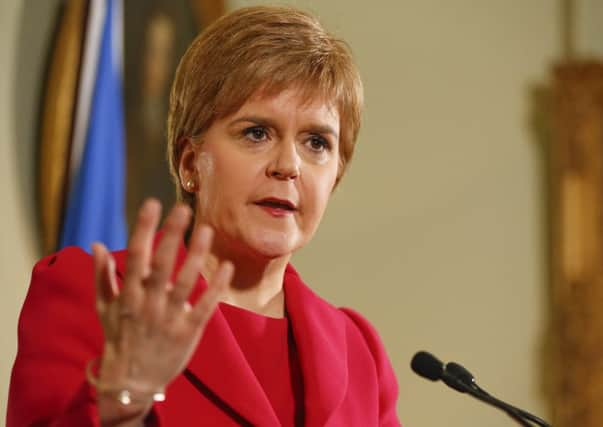Euan McColm: Sturgeon looks more an opportunist than a stateswoman


The upshot is that SNP releases rarely catch my eye. Recently, however, some have stood out.
Last week, the Nationalist spin machine popped out a statement about the potential impact on food prices of Brexit. Consumers faced a “substantial impact” as a result of uncertainties over tariffs and the value of the pound; households faced “considerable and unpredictable changes in food prices, with the poorest households much more exposed to this risk”.
Advertisement
Hide AdAdvertisement
Hide AdThis was, said SNP MSP Stuart McMillan, “just the latest evidence of the needless damage that will be caused if the UK leaves the single market”.
A week or so earlier, the SNP press office issued a statement about the negative impact Brexit would have on wages and living standards. Nationalist MP Neil Gray said it was “clear that a hard Tory Brexit is set to make life even harder for those already struggling to get by”.
Many of you will share the concerns raised by those politicians.
There is nothing especially remarkable about the SNP campaigning against a “hard Brexit”. The avowedly pro-EU Nationalists were on the Remain side of the argument last year.
But what is worth noting is that in both of these examples, the SNP based its comments on predictions made by the Institute for Fiscal Studies. This respected economic research institute has not, after all, always been helpful to the case for Scottish independence.
As recently as March this year, the IFS warned that Scottish independence would mean essential tax increases or spending cuts of more than £1,000 per person. Last year, the IFS said an independent Scotland would face a £10 billion black hole in public finances.
The SNP’s reliance on IFS statistics to help make its pro-EU case is, at best, messy. But, then, the Nationalists’ position on Europe – specifically on the impact of Brexit – is a shambles. The SNP mistakenly believed that the result of last year’s EU referendum would boost support for independence; Scots would be so furious about being “dragged out” of Europe against their will that they would rally behind the Nationalists’ cause. First Minister Nicola Sturgeon now knows that analysis was wrong. Support for Scottish independence remains a minority affair.
Yet some in the party cling to the idea that a catastrophic Brexit deal, one that leaves the UK isolated and suffering some degree of financial chaos, can only help the SNP. Former politician Alex Salmond, for example, has predicted a difficult Brexit will fuel support for Scottish independence. Mr Salmond says a lot of things, though, doesn’t he?
Advertisement
Hide AdAdvertisement
Hide AdOthers in the SNP believe that a bad Brexit deal would be terrible news for the independence cause. Just because Brexit might be bad for the UK, it doesn’t automatically mean it will be good for the SNP.
Ms Sturgeon has been characterised by some commentators – and I include myself among their number – as a utilitarian Nationalist, someone whose constitutional politics was pragmatic rather than emotional. Her adherence to an incoherent strategy on independence and Brexit points to a politician who’s blind to everything but her constitutional obsession.
And it is an incoherent strategy, isn’t it? How does pointing out the dangers of leaving one complex union make leaving another complex union seem like a good wheeze? If the consequence of “taking back control” from the EU is a poorer, weaker UK, how will “taking back control” from the UK look like a more appealing option to voters than it did in 2014?
Ms Sturgeon’s Brexit minister, Mike Russell, is a particular enthusiast when it comes to predictions of EU departure-related chaos. But every time he opens his mouth – or presses “send” on a Tweet – to warn that Brexit will mean uncertainty and chaos, he might as easily be making the pro-UK case against Scottish independence.
The SNP’s star is waning and Ms Sturgeon is under pressure as never before on domestic agenda. Falling standards in schools and missed waiting times in hospitals point to mounting crises across vital services. This being so, it’s doubly baffling that the First Minister should be quite so devoted to a Brexit-centric campaign that can’t help the SNP.
Ms Sturgeon’s mistake in the aftermath of the referendum result last year was to put party before country. Her instinct was to obtain advantage for the SNP rather than arguing that the Scottish Government should play a constructive role in Brexit talks.
By the time, last month, that the First Minister began focussing on the idea of the Nationalists as players, in good faith, in the UK’s extrication from the EU, she looked like an opportunist rather than a stateswoman.
The First Minister – and her predecessor – spent years building reputations for strategic brilliance. Thanks to their leadership, Scottish independence was an inevitability.
Advertisement
Hide AdAdvertisement
Hide AdBut Brexit has smashed those reputations to pieces. The First Minister is pursuing a losing strategy, pinning her hopes on creating a Brexit-inspired Yes majority with the help of economists who damn her own independence plans.